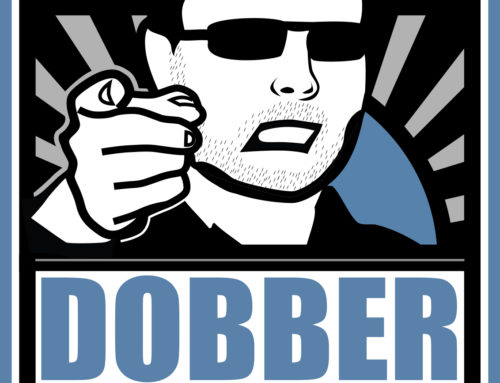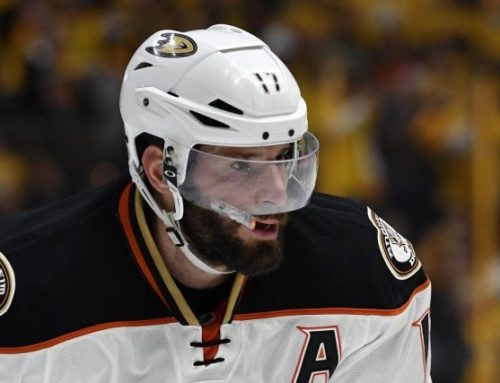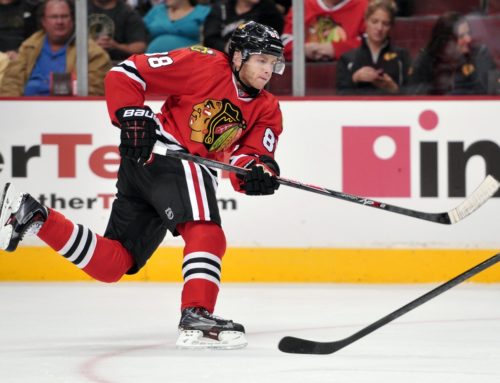
I love the NHL playoffs not only for their nightly life-or-death drama, but also because they remind me of what’s best about the sport of hockey. And no, I’m not talking about the officiating.
I’m talking about watching players rise up and take command of a game – even (and especially) those who are long overdue. I'm talking about wincing as individuals physically sacrifice their bodies on behalf of their teams, often with gruesome results. I'm talking about sitting stunned as the Holy Ghost of Goaltending once again possesses a netminder in a Canadiens' sweater.
The intensity of the playoffs also reminds me of what I dislike about hockey. Now I'm talking about penalties, especially the senseless ones. And this brings me to my yearly internal debate about the value of counting PIMs in fantasy hockey.
PIMs in Hockey…It's Complicated
Hockey's a tough sport, and I like that. You probably do too. And as I was recently reminded during a minor dust-up with a MLSE front office executive over the Marlies' 2009/2010 advertising campaign, many think that it helps sell the game.
Unlike the other big professional sports in North America, hockey doesn't have much of a college campus pedigree behind it. While there were those early scrimmages at the University of McGill, much of hockey's youth was spent in the backwoods, and it was often played by hard men who made their living in lumber camps or frontier mines. That's how we got famous teams with names like the Trail Smoke Eaters, or the Dawson City Nuggets – who had to travel from their hometown in the Yukon to Ottawa, partly by dogsled, to play in the 1905 Stanley Cup (and the Red Wings thought their playoff travel schedule sucked). Any of those guys would be probably as likely kill you with their pick-axe and eat you as answer today's common interview question of 'so, are you a cards-guy, movie-guy or a videogame-guy when travelling?'
Even amid the private jets and glamour of today's NHL, there are many players that we idolize specifically because of their ability to drop the gloves and lay it down on behalf of their teammates. Particularly in Canada, a player who can combine skill with an ability to brawl is quickly lionized – especially if they are polite and unassuming.
Consider Jarome Iginla. I have no problem imaging myself trapped within a burning building (figuring I've written my last bit of hockey heresy), and seeing the Calgary captain emerge smiling and unscathed from a wall of flame in front of me before saying, "Hello, my name is Jarome Ignila. Do you mind if I rescue you from this blazing inferno?" For reasons I don't fully understand, this little scene plays out Simpsons-style in my head.
Even if you now think I'm crazy, just try saying 'Gordie Howe hat trick' out loud without smiling. Angus-Reid recently showed that 84% of hockey fans can't do it (within 3% error, accurate 19 times out of 20). So maybe the MLSE exec was right, at some level we all love our thugs.
But the fact of the matter is that the vast majority of penalties in the NHL aren't heroic, despite any efforts to paint them as such. Often a pro-penalty fantasy argument goes something like this: 'yeah, but he scored twenty goals and sat for 180 minutes last season, what a multi-cat stud!' Implying that the 180 minutes of sin-bin time somehow made the individual a more complete player. To me, this sometimes seems a bit like suggesting that your cousin is an upstanding guy, and he illegally parks in handicaps spaces. Capital fellow.
Further complicating the issue, hockey is peculiar (maybe unique) in that most of us can agree that there is such a thing as a 'good' penalty. The tricky part is to reach consensus on what that is exactly.
As a starting point, most of us can probably agree that anything that prevents a goal is 'necessary', while anything Todd Bertuzzi does is 'heinous'. Maybe we could create some sort of rule to differentiate between good and bad penalties. But as soon as I consider that possibility, I hear my inner James Duthie and Bob McKenize arguing about 'distinct Bertuzzi-like motions'. I know there are some dedicated poolies out there, but in my opinion, there just is no practical way to separate penalties into categories like 'good' and 'bad' for purposes of tabulating pool results. PIMs are a take-it-or-leave-it kind of deal.
I happen to love the elegance of a points-only pool, but don't mistake that as the statement of connoisseur…it's likely just nostalgia for the questionable Hockey Star pools introduced to me by the Toronto Star at a tender young age. But I also love the complexity of more complicated formats, and so I can't just walk away from the embedded practice of counting PIMs.
Should We Abandon PIMs in our Pools?
A hockey outsider probably couldn't understand why we ever started competing in our pools over something that is generally considered a negative aspect of a player's game.
The contradictions explored above notwithstanding, I think it may have happened because of a lack of options.
The NHL didn't always track all the statistics that is does today, but along with goals and assists, penalties have been tracked from the beginning. Over the course of a game, these are all easy items to mark down on a scoresheet for a ref, and they are often the only stats tracked in today's beer-leagues. Yet, it's easy to forget that the professional NHL didn't always track these numbers. For instance, if you start to ask innocent questions about Howe's faceoff percentages during the Wings' 1955 Cup run, or Bobby Orr's number of blocked shots in the spring of 1970, large men in dark suits show up at your door bearing bulky cease-and-desist orders.
We're not completely ignorant of these numbers, but the NHL simply wasn't as enthusiastic about tracking statistics as the many other sports were until very recently – perhaps partly due to its backwoods ancestry.
The plus/minus category wasn't officially tracked until after the original-six era ended in 1967, while shots-on-goals weren't tracked by the NHL until the early 1980s. And it wasn't until 1997, when the Real-Time Scoring System (RTSS) was implemented, that the league started to track the now seemingly indispensible stats of: hits, faceoff percentages, blocked shots, give-aways and take-aways, and ice-time. If you're under the age of 20, you might well wonder how the colour guys on TV ever filled the airtime during breaks in the action before everyone had access to these statistics.
Sp poolies can perhaps be forgiven if we have clung to PIMs as a competitive category longer than we should have. For a very long time, we didn't have much of a choice. But since the RTSS was launched, we now have a much higher resolution picture of what transpires on the ice (statistically speaking anyway). And as a result, we now have so many more unquestionably positive aspects that we could use to compete over in our pools.
It was a long road from Dawson Creek to here, but if the ever-conservative world of professional hockey can evolve, maybe we poolies should to.





 FLA
FLA CHI
CHI NYR
NYR PIT
PIT L.A
L.A COL
COL CAR
CAR UTA
UTA SEA
SEA
 NYI
NYI TOR
TOR VAN
VAN
